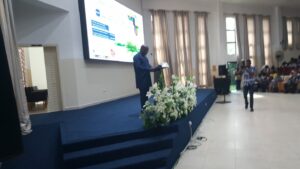By Buertey Francis BORYOR
The University of Ghana (UG) climaxed the 2025 Day of Scientific Renaissance of Africa (DSRA) with a call for Africa to leverage science, innovation, and intellectual property to tackle climate change and drive sustainable growth.
The event, held on June 27 at the university’s Legon campus, brought together scientists, students, government officials, and the military under the theme: “Climate Sustainability: Innovate, Safeguard, Prosper.”
Chairing the event, Professor Gordon Awandare, Founding Director of the West African Centre for Cell Biology of Infectious Pathogens (WACCBIP), lauded the university’s leadership in showcasing African-led science and technology as tools for sustainable development.
He highlighted the historical significance of DSRA, which was established by the African Union to reignite the continent’s commitment to science as a foundation for prosperity.
He acknowledged recent efforts by government to support science, including the appointment of a Minister of State for Climate and Sustainability and the operationalisation of the National Research Fund.
He also welcomed its new policy to absorb electricity costs for university labs and computer centres, describing it as a practical boost to scientific work.
However, he was quick to note the ongoing challenges facing scientific research in the country and across Africa.
“Issues such as inadequate funding, limited access to research tools, and weak industry links continue to hinder progress. There is a need for greater investment and stronger partnerships to bridge these gaps,” he said.
Addressing climate change, Professor Awandare emphasised that the university has placed it at the centre of its 2024-2029 strategic plan. The plan includes a focus on impactful research, and one of its seven priority areas is climate adaptation.

He added that UG is already driving innovation across its colleges and centres through projects that blend environmental science, technology, and public health.
He also said that through a partnership with the MasterCard Foundation and other global institutions, the university has secured long-term funding to support a transformative climate innovation programme. This initiative will engage at least one million young Africans over the next eight years, particularly women, persons with disabilities, and displaced groups.
Professor David Dodoo-Arhin, Director of the Research and Innovation Directorate (RID), in his welcome address highlighted the importance of protecting intellectual property (IP) as a way to turn scientific ideas into impactful innovations.
He stated that safeguarding innovation through IP is central to the university’s work, and the RID is committed to creating an ecosystem that supports researchers and students from idea generation through to commercialisation.
This year’s celebration, he said, also marks fifteen years of the Office of Research, Innovation and Development (ORID), now RID, which has been at the forefront of research excellence and capacity building.
He listed a number of activities undertaken by the various colleges of the university as part of the celebration. These included a blood donation drive, medical outreach, seed innovation events, educational panels, exhibitions, and newsletter launches.
He thanked partners such as the Climate Resilience and Sustainability Collaborative, ISSER, and several university centres for their support.
Meanwhile, Minister of State for Climate Change and Sustainability, Mr. Issifu Seidu, in a speech read on his behalf- underscored the devastating impact of climate change on the nation and the continent at large. From rising temperatures and erratic rainfall to coastal erosion and food insecurity, the Minister said the time for action was now.
He noted that the country’s temperature has increased by 1.2°C since 1960 and could rise by as much as 2.5°C by 2050. “Rainfall in northern Ghana has already dropped by up to twenty percent, and sea levels are rising at a rate that threatens thousands of kilometres of coastline,” he added.
He called for a deeper integration of science and intellectual property into the country’s climate response, explaining that- while science provides the solutions, IP ensures those innovations can be scaled, protected, and distributed widely.
He however urged caution against IP frameworks that exclude the poor or slow down technology transfer, but advocated for models such as open licensing and innovation pools that balance innovation incentives with broad access.
“Ghana’s new Environmental Protection Act and its alignment with IP policy were part of a coordinated plan to ensure green innovation thrives,” he added.
Furthermore, he challenged students and researchers to develop solutions that reflect local realities and to protect those ideas responsibly. “Climate change is not just a scientific issue; it is a moral challenge and an invitation to rise,” he said.










